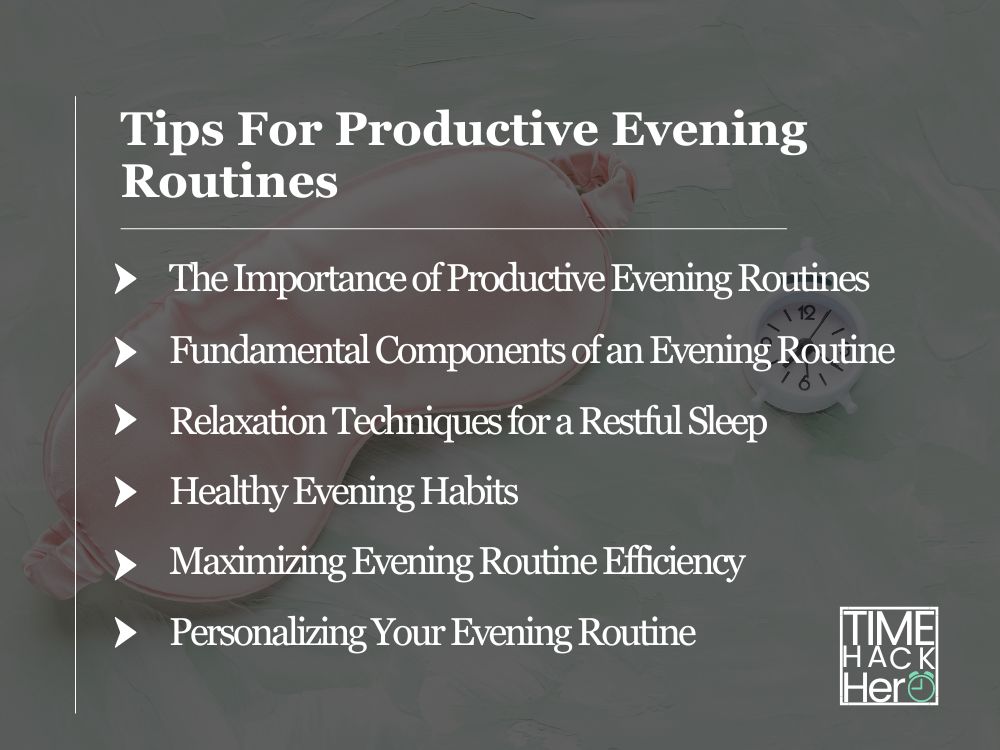In today’s fast-paced world, it’s essential to make the most of our time and ensure that we can be as productive as possible. One of the key elements in maintaining productivity is developing a consistent and effective evening routine. By establishing routines that help set the tone for the following day, we enable ourselves to be better prepared and focused, making the most of the precious hours we have at work and in our personal lives.
An evening routine doesn’t have to be complicated or time-consuming; in fact, simplicity is often the key to success. By incorporating a few essential habits and rituals into our nightly schedule, we can drastically improve our overall productivity and well-being. From setting goals for the next day to establishing a proper sleep schedule, these practices contribute to a more balanced and efficient lifestyle.
With a focus on minimizing distractions and developing healthy habits, implementing a productive evening routine can pave the way for success, both personally and professionally. Achieving a sense of calm and control in the evening helps ensure that we are refreshed and mentally prepared for the upcoming challenges of each new day. So, let’s delve into some tips and techniques to make the most of our evenings and set ourselves up for maximum productivity.
Table of Contents
The Importance of Productive Evening Routines
Health and Well-Being
A productive evening routine is essential for maintaining optimal health and well-being. By creating habits that promote rest and relaxation, you allow your body to recover from the day’s activities, repair itself, and recharge for the next day. For example, incorporating activities like journaling, practicing gratitude, and reading can help you feel more in tune with your emotions, enhance self-awareness, and foster a sense of happiness.
Sharper Morning Productivity
Establishing an evening routine helps set the tone for the next day and ensures that you start off on the right foot. Preparing goals for the next day can minimize the resistance you encounter in getting things done in the morning. A consistent routine that includes activities like planning, organization, and setting priorities allows you to wake up with a clear understanding of the tasks ahead, leading to sharper morning productivity.
| Evening Routine Activities | Morning Productivity Benefits |
|---|---|
| Goal setting | Clear understanding of priorities |
| Planning and organization | Time management & efficiency |
| Prepping materials | Reduced stress and better focus |
Reduced Stress and Anxiety
An effective evening routine can significantly reduce stress and anxiety levels. As mentioned earlier, reading for just a few minutes has been proven to significantly lower stress levels. Other routines, like reflecting on the day and practicing gratitude, can help you process any stressors, promoting better mental health. By engaging in these activities, you create an environment that encourages relaxation and restful sleep, essential factors for overall well-being.
In summary, a productive evening routine is crucial for health, well-being, morning productivity, and reduced stress. By incorporating thoughtful habits, you set the stage for a more productive, happier, and healthier lifestyle.
Fundamental Components of an Evening Routine
Establishing Priorities
Establishing priorities is a critical aspect of an evening routine. By identifying your Most Important Tasks (MITs), you can focus on what truly matters and allocate your time wisely. Reflect on your long-term objectives, and categorize them into various aspects of your life, such as health, career, and relationships. This way, you create a clear vision of what needs to be accomplished before the next day begins.
Creating a To-Do List
Crafting a to-do list is an essential step in your evening routine. It enables you to organize and plan your tasks for the next day. Organize your list with the following strategies:
- Prioritize: Rank tasks according to importance, with MITs at the top.
- Categorize: Group tasks based on context (e.g., errands, work projects).
- Delegate: Identify tasks that can be delegated or outsourced.
- Simplify: Break down complex tasks into smaller, manageable sub-tasks.
Developing a well-structured to-do list reduces decision fatigue and enhances productivity, ensuring a smooth and efficient day ahead.
Journaling and Reflecting on the Day
Journaling is another vital element of an evening routine. It allows you to practice self-reflection and appreciate your accomplishments, as well as identify areas for improvement. Some suggested journaling themes include:
- Gratitude: List a few things you’re grateful for each day.
- Successes: Note your daily achievements and celebrate your progress.
- Challenges: Acknowledge your obstacles and consider possible solutions.
- Learnings: Record new insights, skills, or experiences you acquired.
Furthermore, you can benefit from a brain dump—writing down all thoughts, ideas, and concerns on your mind before going to bed. By unloading the mental clutter, you can ensure a more restful sleep and gain clarity for the days ahead.
Relaxation Techniques for a Restful Sleep
Meditation and Mindfulness Practices
Meditation can be a powerful tool for promoting relaxation and reducing stress, both of which are essential for a restful sleep. Practicing meditation or mindfulness before bedtime might help calm the mind and alleviate any lingering anxiety from the day. This can be achieved through various techniques, such as deep breathing exercises, guided imagery, or simply focusing on the sensations in your body while gradually letting go of lingering thoughts.
Reading for Pleasure or Education
Reading can also serve as a relaxing activity before bedtime. By engaging with a book, you allow your mind to focus on the content, thereby reducing stress and potential distractions. Reading for pleasure can help you to relax, while reading for education can also be beneficial in terms of personal growth and development. Regardless of the genre, avoid materials that may invoke stress or anxiety, as these can hinder your ability to fall asleep.
Implementing a Device-Free Period
Incorporating a device-free period into your evening routine is another helpful strategy for promoting relaxation and restful sleep. Electronic devices, including smartphones, tablets, and computers, emit blue light that can interfere with the body’s production of melatonin, the sleep hormone. By turning off these devices at least an hour before bedtime, you allow your body and mind to wind down and better prepare for sleep. Instead of scrolling through social media or watching television during this time, consider engaging in more relaxing activities like reading, meditation, or conversation with your loved ones.
Healthy Evening Habits
Exercise and Movement
Incorporating regular exercise and movement into your evening routine can help improve your overall health and well-being. A brisk walk or light stretching can help increase your heart rate, boost your energy, and reduce stress. Engaging in these activities can also help you maintain a healthy body by promoting better circulation and flexibility.
Establishing a Consistent Bedtime
A consistent bedtime is essential for maintaining a healthy sleep cycle, as it helps regulate your body’s internal clock. Going to bed at the same time every night can make it easier for you to fall asleep and wake up feeling refreshed. Furthermore, creating a bedtime routine that includes activities such as skincare or reading can signal to your body that it’s time for sleep, promoting relaxation and better rest.
Optimizing Sleep Environment
Your sleep environment plays an integral part in the quality of your rest. To optimize your sleep space, ensure your bedroom is cool, dark, and quiet. You may also consider investing in a comfortable mattress and pillows to support your body properly. Additionally, limiting the use of electronic devices (such as smartphones or tablets) before bedtime can help reduce exposure to blue light, which can interfere with your sleep cycle.
Mindful Consumption of Caffeine and Alcohol
Both caffeine and alcohol can negatively impact your sleep quality if consumed too close to bedtime. Caffeine is a stimulant found in coffee, tea, and some soft drinks, and it can make it challenging to fall asleep or stay asleep throughout the night. To avoid sleep disturbances, avoid consuming caffeine at least six hours before bedtime.
On the other hand, while alcohol may initially make you feel sleepy, it can also lead to disrupted and less restorative sleep later in the night. Be mindful of your alcohol consumption in the evening, and consider cutting back if you find it’s affecting your sleep quality.
Maximizing Evening Routine Efficiency
Organizing the Morning Routine
To ensure a productive morning, organize your routine the night before. Create a to-do list, prioritize tasks, and gather necessary materials for work or personal projects. This includes your laptop, planner, or necessary documents.
- Analyze your schedule and allocate specific time slots for each task.
- Designate a place for your essentials, such as laptop, phone, keys, and charger, to streamline your departure in the morning.
By organizing your morning routine in the evening, you can get a head start on the day and maintain focus as soon as you wake up.
Tidying Up and Completing Chores
Completing household chores in the evening might seem an extra burden, but in reality, it helps save time in the morning and sets the tone for a clean, organized environment. Crucial chores to complete include:
- Washing dishes and wiping down kitchen countertops
- Sweeping or vacuuming high-traffic areas
- Folding laundry and putting it away
A tidy and clutter-free environment helps promote concentration during the day, and frees up time in the morning for other important tasks.
Preparing Meals and Coffee for the Next Day
Preparing meals and setting up your coffee machine the night before not only saves time in the morning but also ensures a nutritious start to the day.
- Prepping ingredients for breakfast, such as chopping fruits or preparing overnight oats
- Packing lunch for work or school in advance to minimize stress in the morning
- Setting up your coffee machine, either using a timer function or pre-measuring the coffee grounds and water
Incorporating meal and coffee preparations into your evening routine fosters a productive morning and allows more time to focus on other tasks.
Personalizing Your Evening Routine
Incorporating Hobbies and Fun Activities
Incorporating hobbies and fun activities can help you build a personalized productive evening routine. It’s essential to strike a balance between relaxation and productivity to end your day positively. Some activities might include:
- Reading: Choose a book or article that interests you, and spend some time reading before bedtime.
- Crafts: Engage in a creative hobby like painting, knitting, or writing.
- Exercise: Participate in a low-intensity workout like yoga, stretching, or going for a walk to relax your mind and body.
- Journaling: Note down your thoughts and reflections about the day, track your progress, and set goals for the following day.
Spending Quality Time with Family and Loved Ones
Setting aside time to be with family members or loved ones at the end of the day is essential for an evening routine. You can strengthen relationships and provide support to one another by:
- Having dinner together: Share a meal with your family to talk about your days and bond over good conversation.
- Playing games: Board games, card games, or video games can help you unwind and foster connections.
- Listening: Give your full attention to your partner or children, encouraging them to share their thoughts and feelings about their day.
- Helping with tasks: Assist your family members with their evening routines, like organizing the house or preparing for the next morning.
Mindful Consumption of Entertainment
When choosing how to relax in the evenings, consuming entertainment thoughtfully can help maintain your productivity levels. Some mindful entertainment options include:
- Podcasts and TED Talks: Listen to educational podcasts or inspiring TED Talks that can enrich your evening and provide valuable insights.
- Documentaries: Watch documentaries on topics that interest you, providing an opportunity to learn and broaden your perspective.
- Screen time limits: Set a specific time to turn off screens and prioritize other activities, promoting healthier sleep habits.
Remember to personalize your evening routine by incorporating hobbies, spending quality time with family and loved ones, and engaging in mindful consumption of entertainment. This balance will contribute to your overall well-being and set the stage for a productive day ahead.









